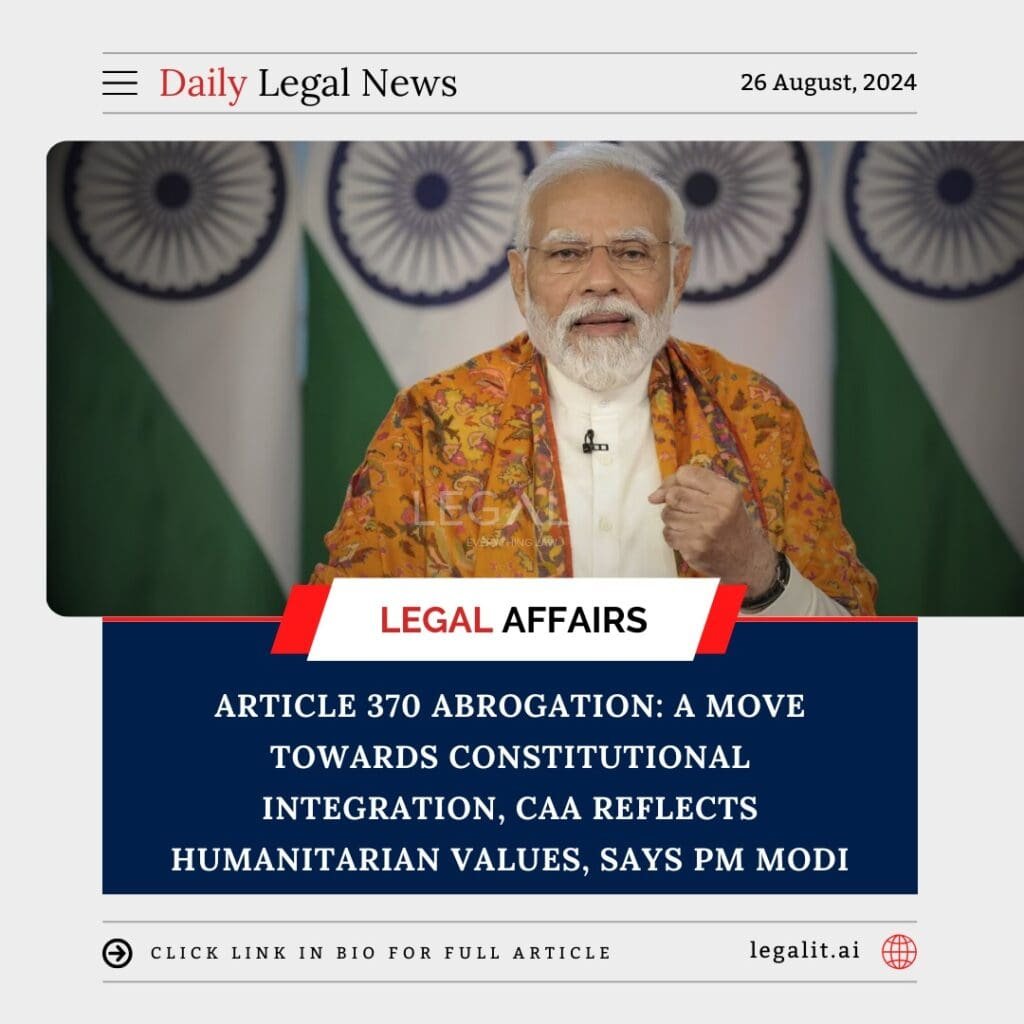
In a recent address, Prime Minister Narendra Modi highlighted two landmark decisions of his administration—the abrogation of Article 370 and the enactment of the Citizenship Amendment Act (CAA)—as key examples of the government’s commitment to constitutional integrity and humanitarian values. These decisions, which have significantly reshaped the political and social landscape of India, reflect the government’s vision of a united and inclusive nation.
Abrogation of Article 370: Constitutional Integration
- Historical Context: Article 370 of the Indian Constitution granted special status to the erstwhile state of Jammu and Kashmir, allowing it to have its own constitution, a separate flag, and autonomy over internal matters except in defense, communications, and foreign affairs. This provision was seen by many as a temporary arrangement, but it remained in place for decades, leading to ongoing debates about its impact on national unity.
- The Abrogation Decision: On August 5, 2019, the Indian government, under PM Modi’s leadership, took the historic step of abrogating Article 370, thereby fully integrating Jammu and Kashmir into the Indian Union. This move effectively nullified the special status of the region, bringing it under the same constitutional framework as the rest of the country.
- PM Modi’s Perspective: In his address, PM Modi described the abrogation of Article 370 as a decisive step towards constitutional integration. He emphasized that this move was necessary to ensure that all citizens of India, regardless of their location, have equal rights and opportunities under a unified legal framework. According to the Prime Minister, the abrogation has paved the way for greater development and stability in the region, fostering a sense of national unity.
- Impact on Jammu and Kashmir: Since the abrogation, the government has implemented various development projects in Jammu and Kashmir, focusing on infrastructure, education, healthcare, and tourism. The region has also seen an increase in investment and job opportunities, which the government attributes to the removal of the legal and administrative barriers that previously hindered progress.
Citizenship Amendment Act (CAA): A Humane Law
- Understanding the CAA: The Citizenship Amendment Act, passed in December 2019, provides a pathway to Indian citizenship for non-Muslim refugees from Pakistan, Bangladesh, and Afghanistan who faced religious persecution in their home countries. The act specifically includes Hindus, Sikhs, Buddhists, Jains, Parsis, and Christians who entered India before December 31, 2014.
- PM Modi’s Defense of the CAA: PM Modi defended the CAA as a humane law aimed at providing refuge and citizenship to persecuted minorities who have faced unimaginable hardships in neighboring countries. He highlighted that the act reflects India’s longstanding tradition of welcoming those in need and offering them a safe haven. The Prime Minister also addressed the concerns and protests that followed the enactment of the CAA, reiterating that the law does not affect the citizenship of any Indian Muslim and that it should be seen in the context of humanitarian relief rather than exclusion.
- Controversy and Support: While the CAA has been praised by many as a compassionate law, it has also faced significant opposition, particularly from those who argue that it discriminates on the basis of religion. Critics have also expressed concerns about its potential impact when combined with a proposed National Register of Citizens (NRC). Despite these controversies, PM Modi’s government has maintained that the CAA is a necessary and just response to the plight of persecuted minorities in the region.
Conclusion:
PM Modi’s recent statements on the abrogation of Article 370 and the CAA reflect the broader ideological and political goals of his administration. By positioning the abrogation as a move towards constitutional integration and the CAA as an embodiment of humanitarian values, the Prime Minister is framing these decisions as essential steps in building a more unified and inclusive India.
The abrogation of Article 370 has undoubtedly changed the dynamics in Jammu and Kashmir, leading to both challenges and opportunities in the region. Similarly, the CAA continues to be a topic of intense debate, with its supporters hailing it as a moral imperative and its critics questioning its implications for India’s secular fabric.
As these policies continue to unfold, their long-term impact on the nation’s legal and social framework will be closely watched, shaping the discourse on national unity, minority rights, and the balance between constitutional mandates and humanitarian concerns. PM Modi’s defense of these actions underscores his government’s resolve to pursue its vision of a stronger, more integrated India, even as it navigates the complex realities of a diverse and pluralistic society.